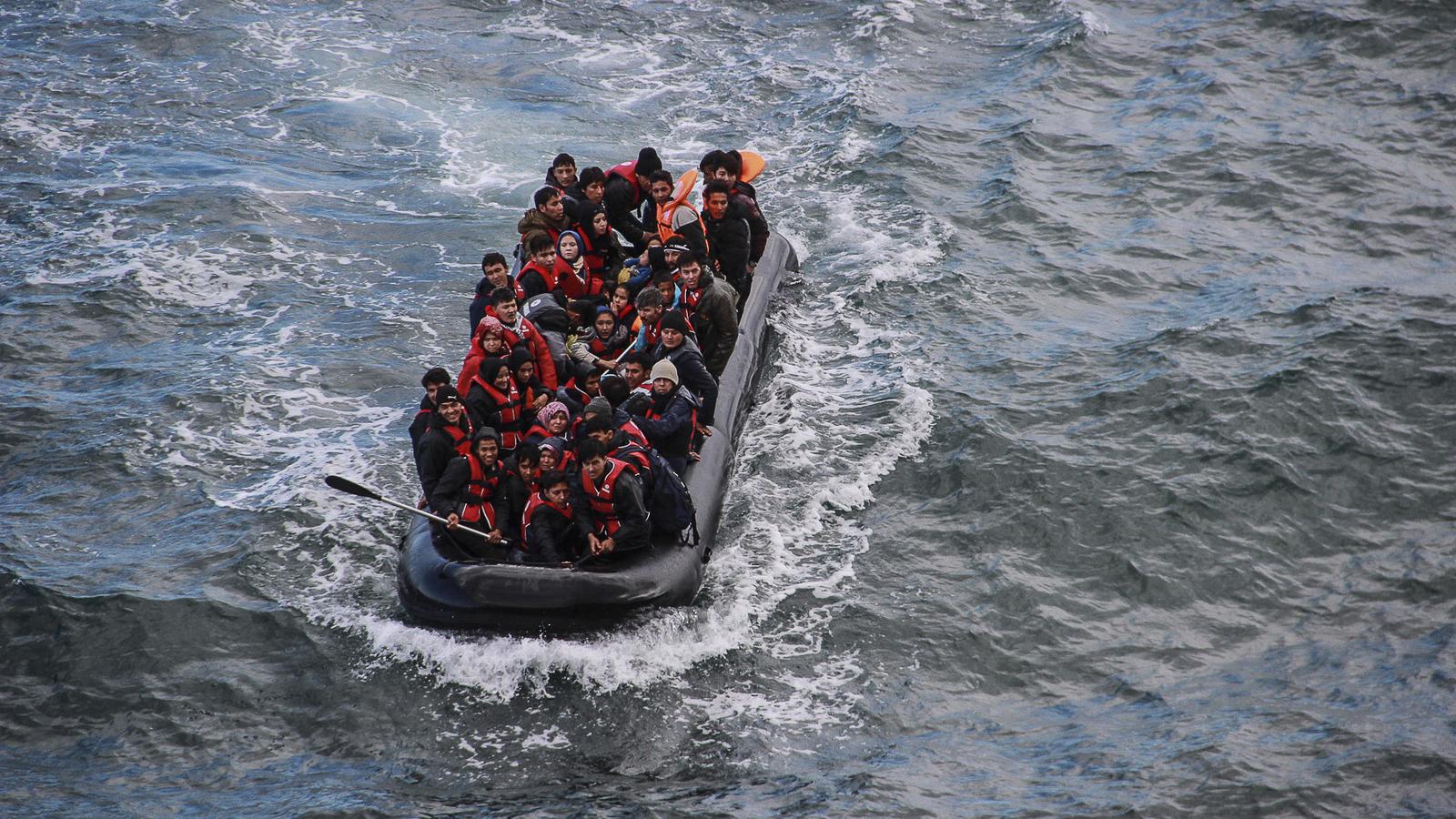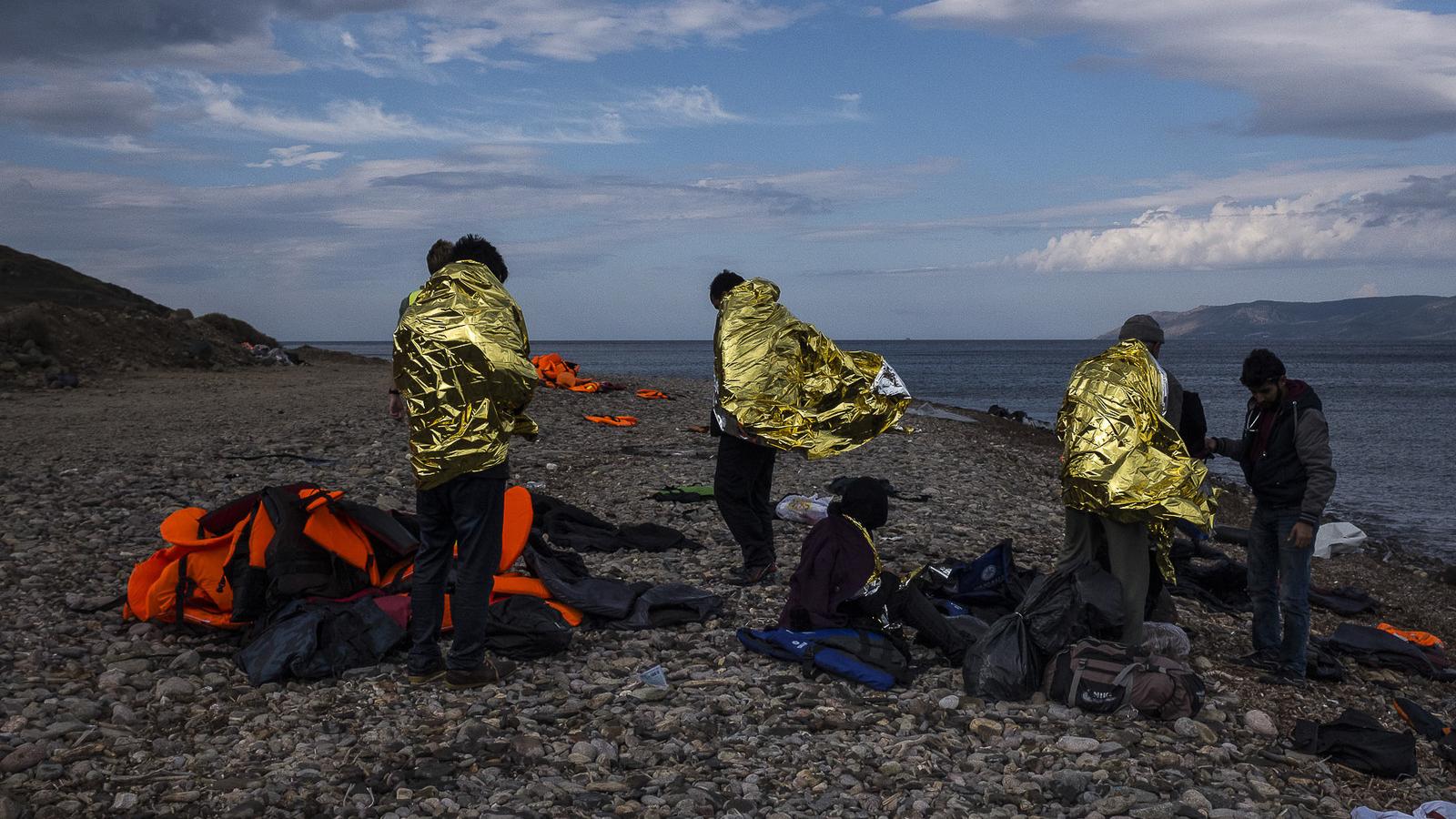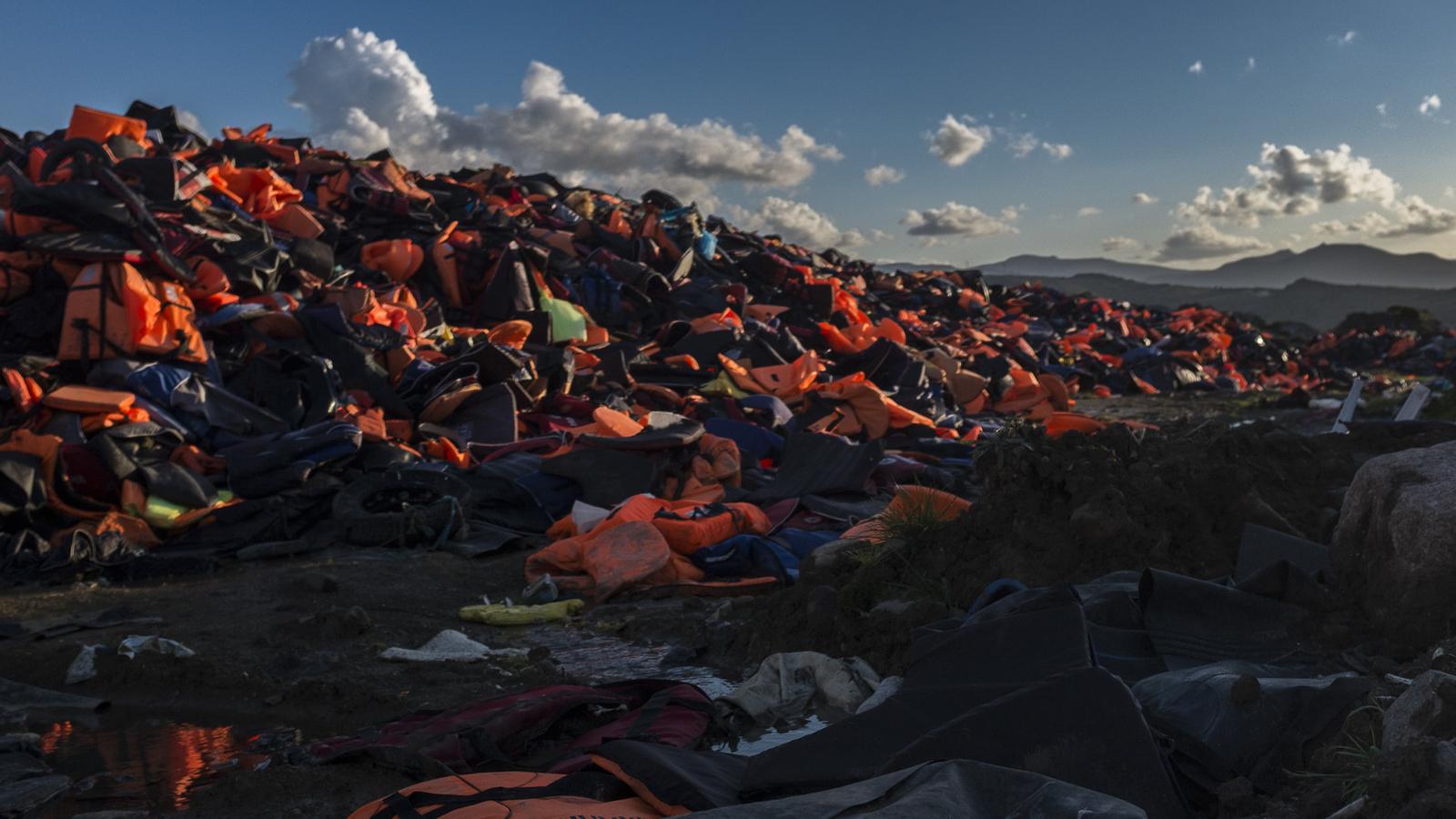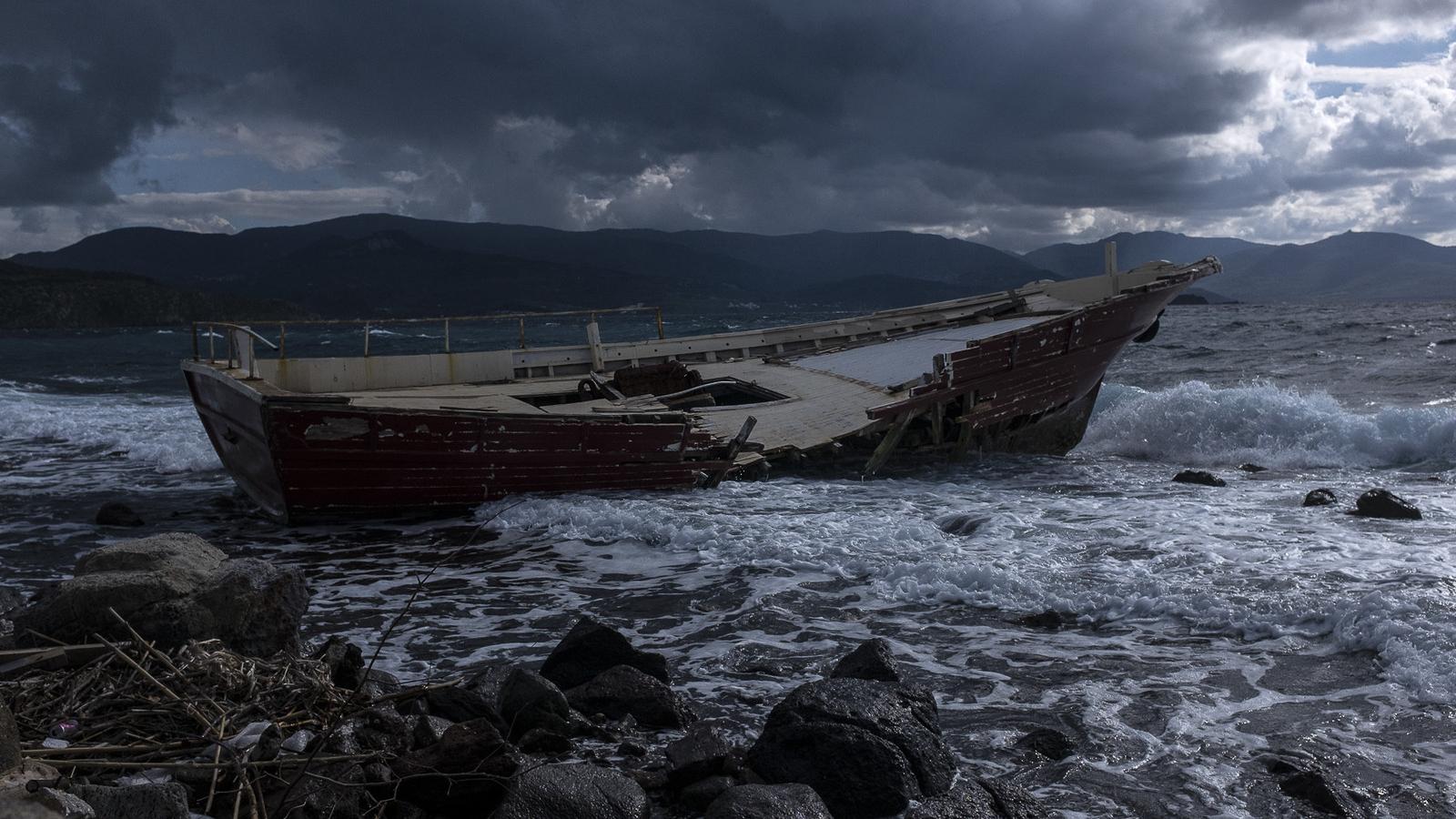Greece’s refugee crisis creates a strain on an already fragile ecosystem
A tattered boat near the shores of Lesbos, Greece.
As the Syrian refugee crisis continues, the influx of nearly 1 million refugees and migrants passing through Greece has had a devastating effect on its environment and economy, particularly during the summers when tourism’s high season is in full swing.
The refugee crisis has exacerbated the damage on Greece’s already fragile environment, leaving many Greeks worried that tourism — its largest industry — will suffer even more after getting hit hard by the debt crisis that began in 2009.
Nearly 60,000 refugees remain stranded in Greece, according to UNHCR data, and are spread out between three main islands — Lesbos, Chios and Samos — where they face abhorrent conditions, as well as mainland Greece in the cities of Athens and Thessaloniki, where the most environmental damage exists.
“The pollution between Turkey and the Greek islands is really beyond everybody’s imagination, and the island of Lesbos has been at the epicenter,” explained Emmanuel Nisiotis, long-time resident and business owner on the island of Lesbos. “This is not a new thing, but now we’ve reached a point where it’s very, very serious.”
The refugee crisis reached a head in the fall of 2015 and spring of 2016 with upward of 5,000 refugees and migrants arriving daily. Yet, in 2016, Greece also raked in 32.8 billion euros, or around 19 percent of the GDP, from tourism alone. In 2017, that number rose to 35 billion euros or 20 percent of the GDP.
According to the World Travel & Tourism Council, this income will rise by 5.3 percent in 2018 and increase 3.7 percent annually to 52.8 billion euros to about 23 percent of the GDP by 2028. But fear still remains as refugee camps have put a strain on an already fragile ecosystem that Greek tourism depends on more than ever.

Related: Greece seeks to speed refugee processing, ease camp overcrowding
Nisiotis, 64, and his Greek American wife, Nikki Blissary, 52, have been living and working on the island of Lesbos for the past 30 years. Until two years ago, they owned a cafe but had to close shop due to a dip in business that coincided with the influx of refugees to the island. They are now working on launching an environmental nongovernmental organization, Clean Wave, to combat environmental issues caused by the refugee crisis as well as years of apathy by local Greeks.
“The population obviously — amongst this economic depression — hasn’t really paid any attention to what has been going on,” said Nisiotis during a phone interview. “No one really wants to do anything about nature, which is understandable, because they have to make a living, but is also not understandable because we are part of nature,” he continued.
Clean Wave is part of a growing number of environmental nonprofits and dedicated individuals who have seen the potential to transform the devastation into job creation as an example of better environmental practices — on Lesbos in particular as well as throughout Greece.
Clean Wave, once officially launched, aims to fight poor environmental practices and lack of awareness among Greeks and incoming refugees through educational programs.
“Everybody … polluting these waters or anywhere around the world has to be stopped primarily through education. We have to educate people — there’s no other means to stop them,” explained Nisiotis. “Policing every single thing and every single fishing boat and every single refugee is impossible. Even if we clean for another 1,000 years we won’t make a difference [if we don’t change].”
Related: Greece exits bailout, but ‘shackles and the asphyxiation continue’
Organizations like Clean Wave and The Dirty Girls— a small organization that collects, washes and reuses heavy-duty UNHCR blankets — are fighting an uphill battle.
The Dirty Girlsco-founder Alison Terry-Evans explained, “Nobody — not the government, not the NGOs, nobody — wants to pay for the washing of the blankets,” which she says she and a small team of international volunteers and local laundries wash to hospital standards and are cheaper to wash than to throw out and replace.
“I have to raise the funds from donors all over the world, and we are talking about at least 1 million euros at this point in time.” According to her calculations, The Dirty Girlshave saved and reused over 700 tons of material that otherwise would have ended up in a landfill.
In most refugee camps across Greece, food is served three times daily by the military in plastic containers, with plastic eating utensils and plastic water bottles, Terry-Evans explains. For example, at Moria camp on Lesbos, three meals a day times 9,000 residents produces 27,000 plastic containers.
These plastic containers are not recycled because Lesbos has never had a recycling center. Instead, the camp dumps them into a landfill every single day. Terry-Evans points out that despite the existence of numerous environmental education and awareness programs targeting the refugee population, the lack of an existing infrastructure in Greece to deal with the problem of excessive use of non-recyclable plastics compounds the growing problem.
This is just the tip of the iceberg, according to Terry-Evans. All the used life jackets and rubber dinghies littering the shores of the main islands where refugees commonly arrive also need a place to go.
“The whole issue of solid waste management is really big,” stated Demtres Karavellas, chief executive officer of the World Wide Fund for Nature in Greece. Based in Athens, the WWF has attempted to prevent and reverse environmental degradation in the region since 1969. “We have gone from a situation where we’ve had several hundreds of illegal landfill sites to a situation of a few of these, but still [the issue] is there. There’s tons to be done on this in terms of the whole ‘reduce, reuse, recycle’ circle and what that means.”
Upcycling: a way forward
Upcycling programs have popped up as one solution to the lack of adequate recycling centers on the islands. Organizations like Lovest— a Greek upcycling social enterprise started in early 2016 — and Mimycri,a German organization started in 2015 by two Germans who were volunteering on the island of Chios, have focused on clearing the islands of thousands of discarded life jackets and rubber dinghies by turning them into usable products, such as backpacks, book covers and jewelry.
“‘Lovest’ actually comes from a very simple combination of ‘life vest’ and of course ‘love,’” explained Jai Mexis, an award-winning architect and co-founder and director of Odyssea, under which the ‘Lovest’ initiative falls. “It has to do with the symbolic representation of transforming a product that was discarded on a beach into a product of value and something that carries more than just the material it’s made of.”
Lovest quickly expanded from a small beach cleanup initiative into something much bigger, providing “employment opportunities to people in need, be they local or guest [refugee/migrant] communities,” said Mexis. By employing refugees in the upcycling process, as well as low-income and vulnerable Greeks, Lovest is tackling two issues at once: cleaning seas and beaches of nondegradable materials, and creating jobs in an economy where the youth unemployment rate reached approximately 38 percent in July 2018.
Lovest’s profits go directly back into “different social projects like a mobile medical unit or a playground from recycled materials that the mayor of Chios asked us for,” explained Mexis.
The organizationrecently partnered with Aegean Rebreath, an independent Greek organization consisting of a handful of volunteer deep-sea divers whose mission is to clean Greece’s polluted seabeds.
“Mostly everyone is really aware of the [coast], and some actions are taking place there,” explains Giorgos Sarelakos, founder of Aegean Rebreath, over coffee in downtown Athens. “However, nobody knows what’s happening beneath the surface.”
This year, Aegean Rebreath removed eight tons of debris — fishing nets, metal and other trash — from the seabed surrounding Athens alone.
But Sarelakos admits that the problem with environmental issues in Greece is large and complex. “In order to address the problem, you need to have multidimensional activities. We are currently setting up some clean-up and collection stations — marine litter collection stations — on the islands,” Sarelakos added.
“But we don’t only do cleanups. We do training in schools, training with fisherman, and we have awareness, impact and engagement [programs]. We do capacity-building with the municipalities, and now we are trying to start research on nano plastics, which have entered the food chain and our bodies.”
“What’s happened in this country over the period of this [economic] crisis is that on the one hand, people locally have become a lot more alienated from the system, because they feel that they’ve been let down,” WWF’s Karavellas notes. “In a sense, it’s led to a lot more solidarity at the local level. Over the last few years, a number of really cool grassroots groups have come together and they are taking on more responsibility …”
But is the trend scalable from local to national or even global? “How can we make this a real turning point for the country?” Karavellas wonders.

Like many others in this field, Sarelakos sees the potential of children in the fight for a cleaner environment. “Kids are very interested in this and they realize the problem. However, there’s a lack of culture concerning government, local authorities and people. We need a new culture, and there has to be a change in the way we talk about the environment.”
Stavros Mirongiannis, manager of the Kara Tepe Refugee Camp on Lesbos Island, agrees. “Our kids are the future so we try to communicate to the kids that they must protect the Earth, that it’s in their hands.”
Still, Kara Tepe produces over 3,000 black plastic food containers every day, thrown in the landfill only a few kilometers down the road from the camp, highlighting the crisis of implementation when it comes to environmental initiatives. “Greece has a strong law, but we don’t enforce it,” said Mirogiannis.
An opportunity for change
While the current refugee crisis and 10-year economic crisis has been challenging, Karavellas hates to see this as a justification for inaction on environmental issues. “I do think it’s still being used as an excuse, either directly or indirectly,” he says. “The mindset isn’t where it should be. We are still in crisis management mode rather than thinking [about the future]. Karavellas acknowledges that youth are more interested in environmental issues but wonders how that can translate into political action.
Rachel LeClear, a long-time volunteer on the island of Lesbos, is one of many individuals and organizations who see the current refugee crisis as an opportunity for change.
“If you look at the level of skill and experience, people are resources,” she said during a Skype interview in August. “And if you look at the materials that are washing up on shore and the creativity people have in making something beautiful or functional out of it, all of this is an opportunity. It’s just a matter of how society reacts to it that makes it possible to capitalize off this opportunity,” she continued.
Related: Refugee women in Greece are moving forward. But many men around them are not.
LeClear has participated in large beach cleanups that make it possible for organizations like Lovestand Mimycri to get their hands on reusable materials needed to make their products. Now, instead of throwing hundreds of life jackets and rubber dinghies into the already staggeringly large landfill — dubbed “life jacket cemetery” —upcycling organizations arrange to collect these materials after a beach cleanup.

Long-time residents of the island, Nisiotis and his wife both believe in the potential of these smaller initiatives, and they also believe that it wasn’t by chance that they got into this type of work. Although their own business closed its doors due to the refugee crisis and a lack of tourism, they remain hopeful about their new organization, Clean Wave, and, more importantly, about the future of Lesbos.
“Beyond the politics and the history behind the refugee crisis, and the pollution, I think Lesbos could set an example,” Nisiotis explained. “It’s hard-hit by the economic crisis, tourism has been hard-hit with businesses closing, and pollution is only one part of it. We believe that Lesbos should be the example.”
Meanwhile, Karavellas and others are adamant about the need for an immediate mindset shift: “… We need a new way of looking at the environment — [in] times of crisis for a country like Greece, [the environment] is a critical competitive advantage of the country,” Karavellas stated. “… Now is the time for a vision and we need to think about the crisis as a time for change.”
As Nisiotis sees it, Lesbos “would be a good unification point to have refugees and locals interacting for something that is unique — clean up after a mess that no one is particularly responsible for, yet everyone is [responsible for].”
While Greece continues to struggle out of its crippling financial and ongoing refugee crises, upcycling programs that also employ refugees and migrants may be paving the way forward for a cleaner and more prosperous Greece.
Editor’s note: This version corrects Alison Terry-Evans’s name and clarifies that The Dirty Girls has a co-founder.
